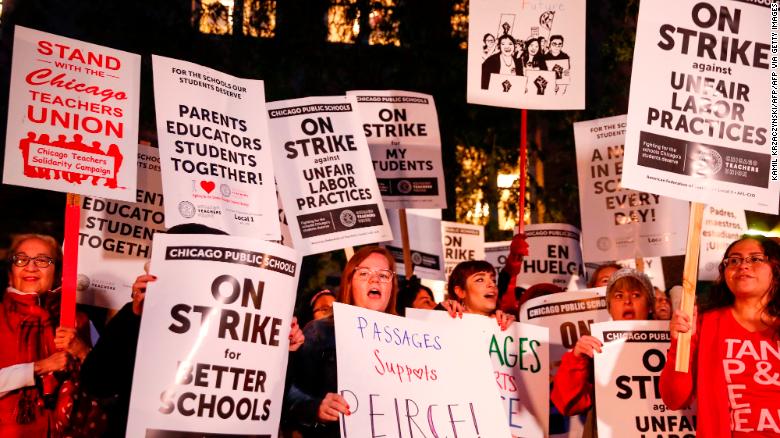Chicago teacher strike
November 15, 2019
After a strike lasting for well over eleven days, Chicago public school teachers returned to the classroom on Friday, November 1st. After picketing day and night and through snow and rain, union leaders and city officials finally came to an agreeable deal, making sure that teachers’ pay would be raised and that a social worker and nurse would be available to each school in the Chicago Public School system.
The city officials also committed themselves to spending $35 million dollars on shrinking overfilled classrooms, prioritizing schools that serve the most poverty-stricken students. This new deal had come with a 15% pay raise for all teachers over a five-year time span and a 40% raise for teaching assistants, receptionists and other underpaid educational workers. This new contract will also work to boost investment in student education and will reduce the number of students per classroom.
“Did we accomplish every single little thing? No. But, I can say that we have moved the needle on educational justice in the city,” stated Jesse Sharkey, President of the Chicago Teachers Union, in a press conference this last week.
Despite the deal struck last week, teachers still have been demanding more. They wanted to see more affordable city housing for students and teachers, and made broader demands to help both students and teachers alike. These demands have been dubbed “bargaining for the common good,” by Vox.
After a strike lasting for well over eleven days, Chicago public school teachers returned to the classroom on Friday, November 1st. After picketing day and night and through snow and rain, union leaders and city officials finally came to an agreeable deal, making sure that teachers’ pay would be raised and that a social worker and nurse would be available to each school in the Chicago Public School system.
The city officials also committed themselves to spending $35 million dollars on shrinking overfilled classrooms, prioritizing schools that serve the most poverty-stricken students. This new deal had come with a 15% pay raise for all teachers over a five-year time span and a 40% raise for teaching assistants, receptionists and other underpaid educational workers. This new contract will also work to boost investment in student education and will reduce the number of students per classroom.
“Did we accomplish every single little thing? No. But, I can say that we have moved the needle on educational justice in the city,” stated Jesse Sharkey, President of the Chicago Teachers Union, in a press conference this last week.
Despite the deal struck last week, teachers still have been demanding more. They wanted to see more affordable city housing for students and teachers, and made broader demands to help both students and teachers alike. These demands have been dubbed “bargaining for the common good,” by Vox.
While Chicago teachers have gotten mixed responses from Mayor Lori Lightfoot, Lightfoot promised to focus on affordable housing. However, this new housing plan will not be a part of contract negotiations with the teachers. The Teachers’ Union did get the city to give sanctioned protection to undocumented immigrants residing on school property, in a short amnesty from Immigration and Customs Enforcement.
All in all, this new deal had proven that strikes have been a valid way of political bargaining. Chicago teachers may not have had all their demands met, but they got more than before, and an extra $30 million dollars of government spending on education in the city.
After a strike lasting for well over eleven days, Chicago public school teachers returned to the classroom on Friday, November 1st. After picketing day and night and through snow and rain, union leaders and city officials finally came to an agreeable deal, making sure that teachers’ pay would be raised and that a social worker and nurse would be available to each school in the Chicago Public School system.
The city officials also committed themselves to spending $35 million dollars on shrinking overfilled classrooms, prioritizing schools that serve the most poverty-stricken students. This new deal had come with a 15% pay raise for all teachers over a five-year time span and a 40% raise for teaching assistants, receptionists and other underpaid educational workers. This new contract will also work to boost investment in student education and will reduce the number of students per classroom.
“Did we accomplish every single little thing? No. But, I can say that we have moved the needle on educational justice in the city,” stated Jesse Sharkey, President of the Chicago Teachers Union, in a press conference this last week.
Despite the deal struck last week, teachers still have been demanding more. They wanted to see more affordable city housing for students and teachers, and made broader demands to help both students and teachers alike. These demands have been dubbed “bargaining for the common good,” by Vox.
While Chicago teachers have gotten mixed responses from Mayor Lori Lightfoot, Lightfoot promised to focus on affordable housing. However, this new housing plan will not be a part of contract negotiations with the teachers. The Teachers’ Union did get the city to give sanctioned protection to undocumented immigrants residing on school property, in a short amnesty from Immigration and Customs Enforcement.
All in all, this new deal had proven that strikes have been a valid way of political bargaining. Chicago teachers may not have had all their demands met, but they got more than before, and an extra $30 million dollars of government spending on education in the city.
While Chicago teachers have gotten mixed responses from Mayor Lori Lightfoot, Lightfoot promised to focus on affordable housing. However, this new housing plan will not be a part of contract negotiations with the teachers. The Teachers’ Union did get the city to give sanctioned protection to undocumented immigrants residing on school property, in a short amnesty from Immigration and Customs Enforcement.
All in all, this new deal had proven that strikes have been a valid way of political bargaining. Chicago teachers may not have had all their demands met, but they got more than before, and an extra $30 million dollars of government spending on education in the city.
































